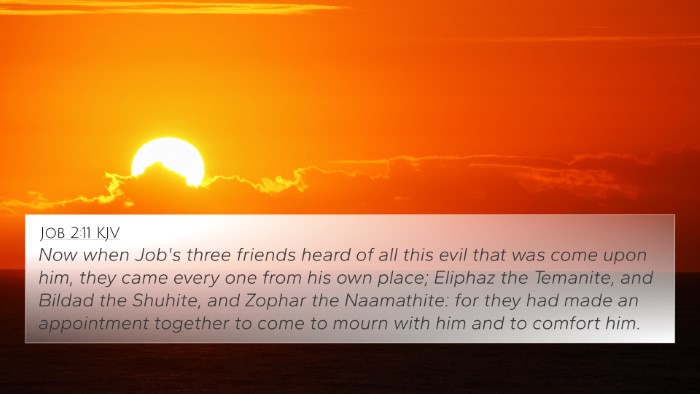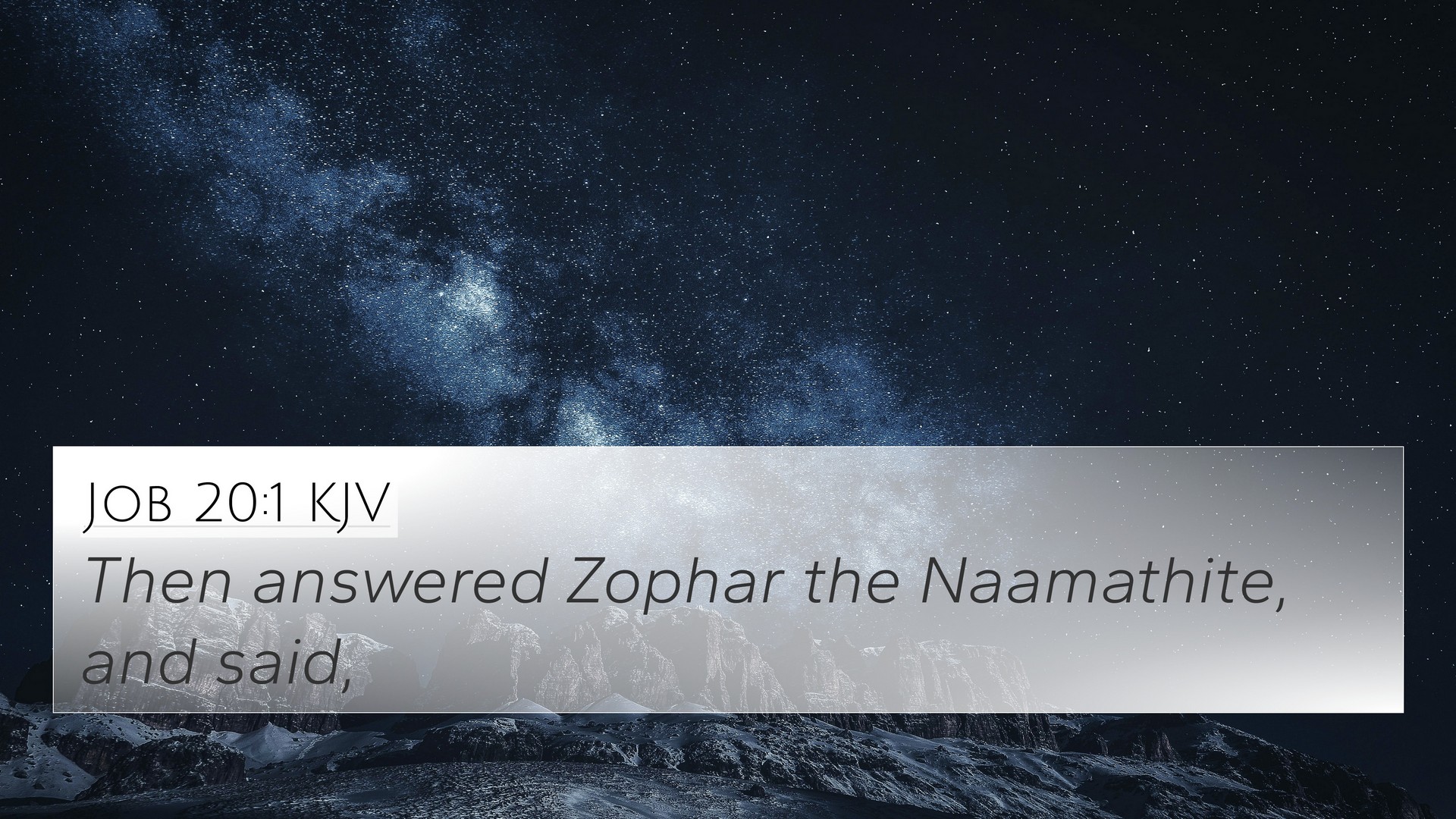Old Testament
Genesis Exodus Leviticus Numbers Deuteronomy Joshua Judges Ruth 1 Samuel 2 Samuel 1 Kings 2 Kings 1 Chronicles 2 Chronicles Ezra Nehemiah Esther Job Psalms Proverbs Ecclesiastes Song of Solomon Isaiah Jeremiah Lamentations Ezekiel Daniel Hosea Joel Amos Obadiah Jonah Micah Nahum Habakkuk Zephaniah Haggai Zechariah MalachiJob 20:1 Similar Verses
Job 20:1 Cross References
Then answered Zophar the Naamathite, and said,
Uncover the Rich Themes and Topics of This Bible Verse
Listed below are the Bible themes associated with Job 20:1. We invite you to explore each theme to gain deeper insights into the Scriptures.
Job 20:1 Cross Reference Verses
This section features a detailed cross-reference designed to enrich your understanding of the Scriptures. Below, you will find carefully selected verses that echo the themes and teachings related to Job 20:1 KJV. Click on any image to explore detailed analyses of related Bible verses and uncover deeper theological insights.

Job 2:11 (KJV) »
Now when Job's three friends heard of all this evil that was come upon him, they came every one from his own place; Eliphaz the Temanite, and Bildad the Shuhite, and Zophar the Naamathite: for they had made an appointment together to come to mourn with him and to comfort him.

Job 42:9 (KJV) »
So Eliphaz the Temanite and Bildad the Shuhite and Zophar the Naamathite went, and did according as the LORD commanded them: the LORD also accepted Job.
Job 20:1 Verse Analysis and Similar Verses
Understanding Job 20:1
Verse Text: "Then answered Zophar the Naamathite, and said," (Job 20:1, KJV)
Summary of Job 20:1
In Job 20:1, Zophar, one of Job’s three friends, responds to Job's previous statements regarding his suffering and the justice of God. This dialogue occurs within a larger context of debate, where each friend seeks to explain Job's calamities as a consequence of his own wrongdoing. The verse highlights the themes of human suffering, divine justice, and the struggle to understand God's ways.
Insights from Commentaries
This verse marks a continuation of Zophar's discourse, where his role is to rebuke Job for alleged sins. This perspective is consistent throughout the book, with varying degrees of emphasis on accountability for sin and the nature of God’s justice.
-
Matthew Henry's Commentary:
Henry emphasizes Zophar's swift response, implying the urgency and intensity of his feelings towards Job’s lamentations. Zophar exhibits a dogmatic approach, asserting that the wicked will not ultimately prosper, which reinforces the overarching message of divine justice.
-
Albert Barnes' Notes:
Barnes notes that Zophar’s speech often lacks compassion, focusing instead on the idea that God’s punitive measures against sin are inevitable. This perspective sheds light on the theological viewpoint present in the text, highlighting the relationship between sin and suffering.
-
Adam Clarke's Commentary:
Clarke discusses the historical context of Zophar’s character and his timing in the dialogue. He illustrates how Zophar speaks out of a sense of moral obligation to correct Job, which reflects the prevailing beliefs of the time regarding divine retribution.
Thematic Bible Verse Connections
This verse can be connected to various themes within the scripture, illustrating the concept of divine justice as well as the fallibility of human understanding. Here are several Bible cross-references:
- Job 4:7-8: Eliphaz questions, "Whoever perished being innocent?" emphasizing the belief in retribution.
- Job 11:14-15: Zophar himself speaks of the necessity of putting away iniquity to approach God.
- Psalm 73:16-17: A perspective shift regarding the prosperity of the wicked is critiqued, relating to Zophar’s assertions.
- Proverbs 11:21: It states, "The wicked shall not be unpunished," resonating with Zophar’s claims.
- Malachi 3:15: Questions arise regarding the outcomes of the unrighteous, a theme relevant to Zophar’s discourse.
- Romans 2:6-8: Paul discusses God's judgment according to deeds, paralleling Zophar's beliefs.
- Galatians 6:7: "Whatsoever a man sows, that shall he also reap," a scriptural basis for Zophar's argument.
Applying Cross-Referencing in Bible Study
To fully grasp the meaning of Job 20:1, it is beneficial to utilize tools for Bible cross-referencing. Understanding the connections between Bible verses not only enhances interpretation but also deepens one's understanding of theological themes.
Tools for Bible Cross-Referencing
Here are some effective methods for Bible cross-referencing:
- Utilizing a Bible concordance to find related verses.
- Exploring cross-reference guides specifically designed for thematic studies.
- Engaging in cross-reference Bible studies that highlight thematic connections.
Identifying Connections
Understanding how to find cross-references in the Bible can enhance your study. For instance, identifying connections between Old and New Testament passages can reveal the continuity of God’s message concerning justice and mercy.
Conclusion
Job 20:1 presents a critical moment in the dialogue between Job and his friends, encapsulating themes of suffering and divine justice that resonate throughout scripture. By employing cross-referencing techniques, readers can uncover deeper insights and thematic connections that enrich their understanding of the Biblical text.



